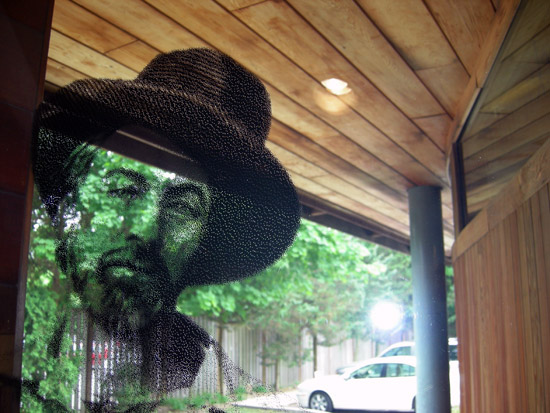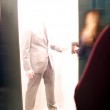
Having followed the poetry scene on both sides of the Hudson for years, it was inevitable that I would come to know the poets paired for this interview. In 2010, I met George Wallace at the Bowery Poetry Club where he was host for that Sunday afternoon’s reading. I immediately appreciated the excitement he generated and the encouragement he offered to the features and those, like me, who would participate in open mic. I met Romanian-born poet Claudia Serea at the Williams Center in Rutherford, New Jersey in 2010. There, I was surrounded by poets who would eventually offer to publish her work and mine in the same Red Wheelbarrow anthology that year. When I learned that the two poets knew each other too, they became perfect candidates for the artist-to-artist interview series. Claudia would ask George to decode poetryland and George would oblige, revealing a mindfulness about poetry that straddles high and low culture, emphasizing the roles of plurality, craftsmanship and discovery.
George Wallace is the 2011 Writer-in-Residence at the Walt Whitman Birthplace. He is currently on tour promoting Walt Whitman and Beyond—Fanfares for the Common Man both stateside and overseas. He is the author of 19 chapbooks of poetry, professor at Pace University in New York, a well-known and highly regarded poetry promoter. Here, he is interviewed by Romanian-born poet Claudia Serea whose work and translations have appeared in Exquisite Corpse, Mudfish and 5 a.m. and is the author of two poetry collections.
Claudia Serea: What makes the American poetry American? Is it the geography, the social message, the aesthetic? Is there an American aesthetic?
George Wallace: There are a lot of different kinds of American poetry. Language poetry is different from spoken word and neo-formalism, for example. There are also a lot of diverse voices and approaches. This is a country made of different people and their cultural voices come from Japan, Korea, Africa, Eastern Europe. So, we should use the plural: American poetries. There are multiple voices. It’s less geographical than cultural. Diversity also comes from the plurality of interests in America. A Beat poet doesn’t have the same interest as an academic scholar. The answer is plurality.
CS: On your blog “Whitman and Beyond: Fanfares for the Common Man,” you talk about Walt Whitman’s “brawny anti-intellectualism” and his praise of the American “Barbaric Yawp.” Williams Carlos Williams also strove to write “in the language of Polish housewives.” Today’s poetry has a more sophisticated approach to language, and is often experimental. How do you bridge tradition with contemporary trends? Are today’s poets still writing for the common man?
GW: Many of them are, just not the well-known ones. Language poets are not particularly concerned with the common man. But there are many places where one can find poetry written for the common man: at the Nyuorican Café, or at cowboy poetry conventions. But you can’t have the ying without the yang. There is an anti-intellectualism trend and also an intellectualism trend, an academic trend. At the Bowery’s “Page Meets Stage,” for example, they pair a writer known for his written work with a writer known for his performance poetry. It’s a dialogue between the two trends, an uneasy one, similar to the one between a parent and his child. One has to write for both. Failure to meet both standards would result into having stand-up comedians and ranters on one hand, or falling into obscure snobbism on the other, such as the intellectual arrogance of Pound and Elliot.
Personally, my goal is to write for both standards: common accessibility with the complexity of thought and craftsmanship of the academic standard. I believe it’s possible to do both—and necessary.
CS: You have done an important and extensive work as a poetry organizer. What is the poet’s role in the community?
GW: I think the poet’s primary responsibility is to be a poet. They have to concentrate on the magic of craftsmanship. I wouldn’t prescribe that they should be community-oriented. It’s certainly advantageous for poets to be communal, to support each other, to create selflessly, and maybe anonymously, and to broaden the ecology of poetry. I happen to be trained in that respect. But the best leader is the one who doesn’t stand at the top and gets the glory. The best leader is the one who turns over the power of success to the people.
A lot of Americans think they can adopt the Eastern philosophy, but you have to be ego-less. That’s very hard for poets, as they have to value their own opinion. This is the magic trick, to be an effective community-based poet. It’s a wire act.
CS: You are well known for your performance poems. Do you write for the ear? Do you read the poems aloud when you write them? How do you integrate poetry and performance?
GW: I don’t read them aloud, but I hear them. And I let the music of the language, as it emerges, to guide the direction of the poem. Performance is built-in. I build the elements of successful performance into the poem: cadence, rhythm, repetition, internal rhythm, and persona.
CS: Is poetry music? If your poetry were a musical instrument, what would it be?
GW: One of the things that poetry is—is music. It’s not the only thing. A poem wouldn’t be a drum. It has to be an instrument that growls or purrs like an animal. At the same time as people are listening, they hear the music combined with ideas and images. This happens quickly. In a performance piece, you don’t develop a single idea, but a bombardment of ideas. And music makes it impressionistic.
The poem needs to be an orchestra, or at least a string quartet. Like cubism, the poem represents a thing in fleeting pieces. The same surprise of discovery has to happen in the experience of hearing a poem. I want the audience to experience the excitement of discovery, not to give explanations.
CS: What is your advice for the young poets? Something they should or shouldn’t do?
GW: My advice for the young poet: allow yourself to be young. Explore the energy and excitement of being young, but pay attention to experience in the world.
To the young genius: give me the answers, because I don’t have them yet.
CS: Can you predict the future of poetry? Will printed books disappear? How will the internet shape the writing and disseminating of poetry?
GW: Big question. I don’t think that books will disappear. Eyesight will disappear before books. Books are a good technology, but not the best one for communicating stories. The best one is a campfire—but you can’ have a campfire in bed, or in the bathtub. I think you have to look at what’s gained and what’s lost.
You experience a book with multiple senses, something the internet can’t offer. I love the internet, though. It has the advantage of redundancy, of multiple places and platforms to store information. But it’s not the definition of the future. If anyone pulls the plug, it’s gone. The reason why books were successful was Thomas Jefferson who sold his books that became the Library of Congress. He placed books in every library—which brings me to “Lots of copies keeps stuff safe,” the LOCKSS system that Stanford University built to archive electronic copies of published journals, social and cultural studies, including poetry magazines (Poetry Bay, too.) Every library that subscribes has access to it.
CS: In 1989, the Romanian Revolution was carried on with a song and poem that emerged as an anthem after being banned for 47 years. Recent events in Egypt and elsewhere showed people using rhyming verse and songs to deliver their messages. Does poetry have real power? Can it change the world?
GW: Poetry has power as real as the people who wield it. It can be used for all the different human enterprises, including liberation. What kind of power? Power that people turn to when they seek power, and look for necessary words. This happened after 9/11, when poems were sent to the site; they were posted on the walls and fences. It happens when a fireman retires after 50 years of service, and, at the retirement dinner, he reads a poem because he was moved to do so. People turn to heightened forms of expression when they have needs to express. If they don’t, they say “I’m at a loss for words.” Poetry makes it possible for us to never have to say that.
Artist Websites:

 RSS
RSS
